Speculators cut net-long positions in Brent
Money managers and hedge funds reduced their net-long bets on ICE Brent futures in the week to 6 May, driven primarily by an increase in short positions in the global oil market.
 IMAGE: Crude oil barrels. Getty Images
IMAGE: Crude oil barrels. Getty Images
Speculators reduced net-long positions in Brent futures by about 12,000 lots to just under 98,000 lots, according to futures and options data from ICE Futures Europe.
The drop in net-long positions marks the second consecutive week of decline. The gross-long positions in Brent fell by a little more than 3,000 lots during the week.
This week’s data is the “least bullish bets since the week ending on 29 October 2024,” according to two analysts from ING Bank.
Speculative trading occurs when money managers and hedge funds invest based on expectations of future price movements. The slump in buying interest comes after the world’s largest oil producers’ group, OPEC+, decided to bring larger-than-expected volumes of crude oil back in the global oil market.
In April, the coalition agreed to increase supply by 411,000 b/d, more than the scheduled hike of 135,000 b/d. The Saudi Arabia-led group has since announced plans to continue its production hike as its members proceed with the gradual unwinding of their joint 2.2 million b/d output cuts between April 2025 and June 2026.
Commenting on the latest trend, ING Bank analysts said that the decline in Brent's net-long positions was “driven predominantly by the rising short positions by 8,887 lots to 113,008 lots over the reporting week.”
When speculators cut their net-long positions, oil prices typically fall. Conversely, when they boost these positions, prices tend to rise, leading to a cycle where their actions can influence the market and oil prices.
However, adding to market surprise, trade tensions between the US and China eased over the weekend, after officials from the two top crude oil consuming nations reached an initial trade agreement in Geneva, boosting demand growth sentiment.
Washington has decided to reduce levies on most Chinese goods from 145% to 30% and Beijing said it will lower duties on US imports from 125% to 10% for a 90-day initial period. This news could boost speculative sentiments in the upcoming weeks and provide some support to Brent.
“This [oil] market continues to gauge the potential tariff impact on oil flows into the US,” ING Bank analysts said.
By Aparupa Mazumder
Please get in touch with comments or additional info to news@engine.online





